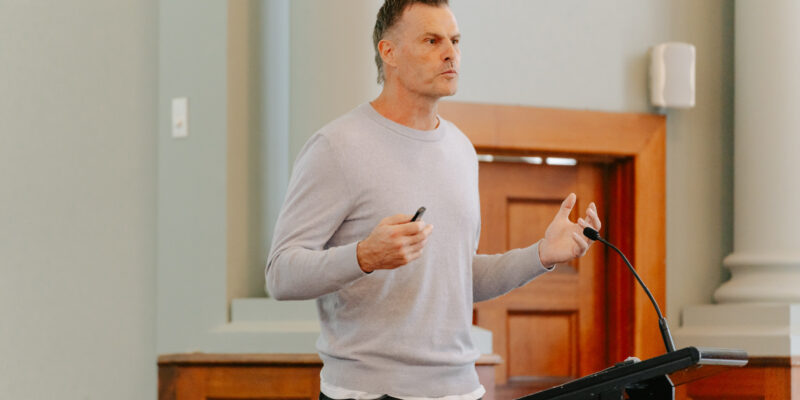AFL great Luke Darcy on leadership lessons for conveyancers
The Western Bulldogs legend talked to practitioners about the way a new generation of leaders is more inclusive and supportive than ever.

THE early days of AFL star Luke Darcy’s career were marked by some brutal moments.
At just 18, the Western Bulldogs rising star was playing his fourth match against Hawthorn. His intimidating opponent was Chris Langford, 12 years his senior and at the peak of his prowess.
“We were getting smashed and the reason is because of me,” Darcy recalled.
“I was just completely outplayed in every sense of the word.”
Fully aware he was falling short, Darcy saw the Western Bulldogs’ runner heading towards him with a personal message from the coach.
“His style was to take the coach’s ferocious message and add 25% of his own on top,” Darcy said.
“I’ll never forget what he said to me that day. He yells out, so everyone can hear: ‘The coach thinks you’re playing the worst game in AFL history.’
“I remember Chris Langford pissing himself laughing.”

But the public critique wasn’t over: “The funny part is he’s going to leave you out here because he thinks it’s not possible to play any worse,” the runner continued.
Darcy was deflated, but teammate Tony Liberatore lifted his spirits, crossing the field just to hurl a cheeky sledge at Langford.
“I remember thinking: ‘Wow, this teammate who clearly knew how bad I was going, took some time out to run 250 metres to just see if he could make me feel a bit better’.
“I remember thinking, ‘I’ve got to find a way to care as much as he does’. But I remember also thinking, ‘Geez, that wasn’t that helpful, that message from the runner.’”
Darcy reflected on the changing face of leadership during his keynote speech at Australian Conveyancer Magazine’s inaugural ‘Beyond Conveyancing’ event on May 7, before over 100 industry figures.
Darcy – who played over 200 games for the Western Bulldogs before becoming a respected media identity and now co-founder of coaching firm, Aleda – described the leadership from that era as “brutal” and “intense”.
While it might prompt laughs today, most players felt they had no real say in their own development.
The coaches were seen as all-knowing and their word was law.
“A lot of people couldn’t cope with that,” Darcy said.
“We lost a lot of good people because there wasn’t any nuance in the way that people led in that era.”
Today’s leaders have flipped the script, with AFL coaches like Collingwood’s Craig McRae frequently expressing his love for the athletes in his care.
“Can you imagine an era we played in that a coach would talk about love?” Darcy asked.
Rather than paying lip service to family values, the club lives by it, even inviting mothers to training for Mothers Day.
“My mum married an AFL footballer, her son was an AFL footballer, her grandson’s an AFL footballer. She’d never been anywhere near the training room before,” Darcy said.
“It costs nothing, but they live the family values.
“That’s how you create great empathy and great connection.”
Darcy says the new generation of leaders is more inclusive and supportive than ever.
“The people we see around the globe in high pressure roles, they’ve got more empathy than ever before, more connection to people than ever before. They understand people’s families more. It’s genuine and authentic. Then inevitably, when you need to have a difficult conversation, because we all do, it’s an easy thing. It’s not the brutal: ‘Can you cope, or are you weak or are you out?’”
Darcy emphasised how good leadership was life changing, highlighting the transformative impact of his childhood friend Matt Wadewitz’s teaching methods.
Wadewitz became the champion of a group of South Australian teens on the verge of being kicked out of high school, by sparking their curiosity in a local unsolved murder.
Inspired, the students took their learning to the real world, eventually helping reopen the cold case.
The impact on the students was life changing, with all going on to complete year 12 and 80% pursuing tertiary study.
“Their life changing moment happened because someone took some care and empathy in their world, when others would have easily just let them slip by,” he added.
Darcy encouraged conveyancers to reflect on their own leadership practices and how to fill their own cup to be their best for others.
He referenced US basketball coach Mike Dunlap and Hal Elrod’s book ‘The Miracle Morning’, which promotes six life-transforming daily habits: meditation, affirmations, visualisation, exercise, reading and scribing.
“You would set yourself up in a way that would allow you to live a pretty extraordinary life,” he said.






